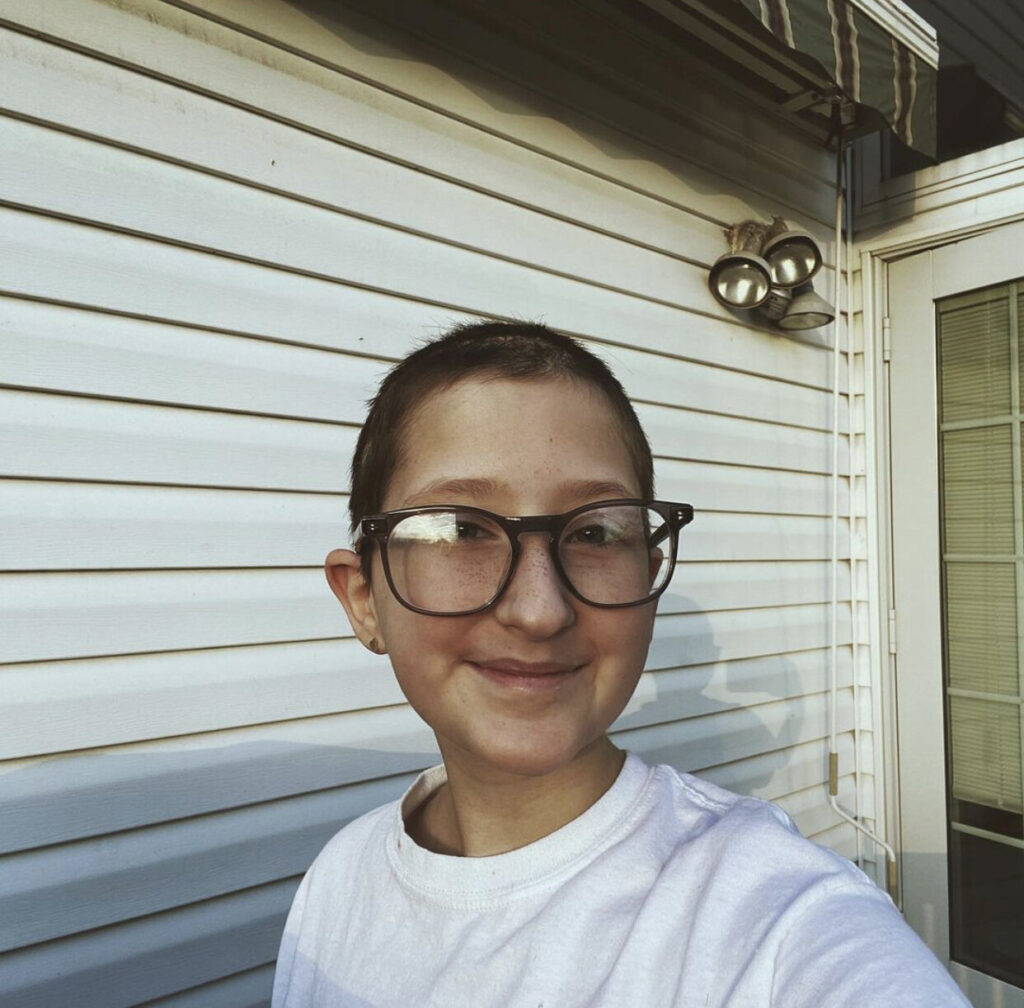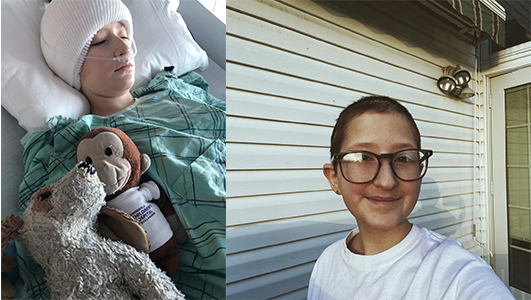Abigail Memmesheimer, age 14, of Staten Island, New York, is our latest handheld blood analyzer recipient. Abby was recently diagnosed with a hypothalamic-optic nerve germinoma and has undergone chemo and will soon be going through radiation. Staci, Abby’s mom, shares Abby’s brain tumor story.
Contributed by Staci Memmesheimer
When Abby was in the 7th grade she started complaining of nausea and occasional abdominal pain. I did all the things any mom would do. I took her to the pediatrician and then to the GI specialist to get her to feel better. She started to lose weight but finally after going to Weil Cornell in the city, we started to make progress. After a year, she put on 12 pounds and was drinking more and more water as per the GI doctor’s instructions. The nausea still came but a little less frequently.
In June of 2020, she complained of trouble seeing. My husband took her for an eye exam and she needed a stronger eyeglasses prescription. She started napping and having daytime sleepiness but with COVID and the strange change in her routine with later bedtimes and constant zooming, I didn’t really give it too much of a second thought.
In February 2021, Abby complained of not being able to see. I didn’t know how this could be, since her eyes were checked just over 6 months ago. I deduced it was one eye by asking her to cover the good eye. When I stood off to the side, she couldn’t see me in her peripheral vision. That’s when I began to worry and when our nightmare began.
I took her to the pediatric ophthalmologist the next day and, as he checked her vision, Abby’s anxiety grew. I tried to maintain a good mom poker face. By the next day, we were in the pediatric neurologist’s office and, by the following Saturday, she was having MRIs of the brain and orbits.
On February 22, 2021, I would take the most frightening phone call of my life when the doctor said Abby has an optic nerve pathway glioma, except it wasn’t! We were at NYU in Dr. Wisoff’s office two days later, where we were told surgery wasn’t necessary and she was sent to the neuro oncologist.
After more testing and more consultations and a diagnosis of diabetes insipidus, it was now deemed an open craniotomy biopsy would be necessary to determine if her tumor was a glioma or germinoma.
She was admitted several days prior to her scheduled craniotomy as her sodium was elevated and needed to be within a normal range otherwise the surgery would have to be postponed. This meant multiple sticks twice a day to make sure her sodium stayed within the appropriate range.
Abby’s surgery which was supposed to entail only a 2-3 day hospital visit but because of her endocrine involvement, it became an even scarier nightmare with a 15 day hospital stay, 10 of which were in the Pediatric Intensive Care Unit.
“As her condition improved, I began to wonder how we would manage all of this at home, and I had 26 years of experience as a nurse and nurse practitioner!
”
Controlling her sodium was easy enough in the PICU when you have a nurse at your bedside two steps away and an a-line in place to draw blood every hour. This eventually led to a blood transfusion because of the continuous need to draw blood.
On post op Day 4, just when Abby appeared to be on the road to recovery, disaster struck again as Abby experienced an episode where her sodium dropped too quickly, and she began losing urine and eventually consciousness. The amazing staff of nurses and doctors were able to stabilize her, but she would remain lethargic and weak for the next several days with multiple medication drips until her condition started to improve.
As her condition improved, I began to wonder how we would manage all of this at home, and I had 26 years of experience as a nurse and nurse practitioner! Will she really need to be stuck twice a week or daily? How will I know if her sodium is where it needs to be?
Luckily, Dr. Breidbart, Abby’s endocrinologist, told us about the Raymond A. Wood Foundation and the resources they have for kids with diabetes insipidus. I reached out to the foundation while Abby was still in the PICU and I knew they understood exactly what we were going through, but, more importantly, the Raymond A. Wood Foundation would know what our daughter, Abby, would need to be managed at home with peace of mind and less anxiety.
The handheld blood analyzer that would allow us to monitor Abby’s sodium arrived at our home by the second day we were discharged. We were having to monitor fluid intake and output while trying to determine whether or not her medication (DDAVP) was correct. The medication might drop her sodium too much and cause nausea, headache, confusion, or worst of all life-threatening seizures. Similarly, if her sodium went too high, her little body couldn’t compensate the way it had prior to the diagnosis of hypothalamic-optic nerve germinoma.
“Being able to monitor her sodium at home without multiple trips to the lab or doctor’s office is a necessity, not a luxury, it saves valuable time, costs, and lessens anxiety for both the survivors and their families.
”
With the handheld blood analyzer, we would know what to do by getting a sodium level within minutes. Being able to monitor her sodium at home without multiple trips to the lab or doctor’s office is a necessity, not a luxury, it saves valuable time, costs, and lessens anxiety for both the survivors and their families.
Raymond A. Wood Foundation’s handheld blood analyzer program, in addition to the education, individual family support and creating awareness of the challenges and triumphs of brain tumor survivors they provide, is invaluable. The work they do is a necessity for families like ours and gives brain tumor survivors a greater chance of thriving and getting the best quality of life possible without the added worries that come with managing the lasting conditions that are caused.
I can only hope the Raymond A. Wood Foundation’s generous donors will continue to support this worthy cause and truly understand the difference their gift makes to all the amazing brain tumor survivors including our beautiful Abby!
The Raymond A. Wood Foundation currently has six patients waiting for handheld blood analyzers. Please consider supporting this program so families like the Memmesheimers can better manage their child’s care at home.


